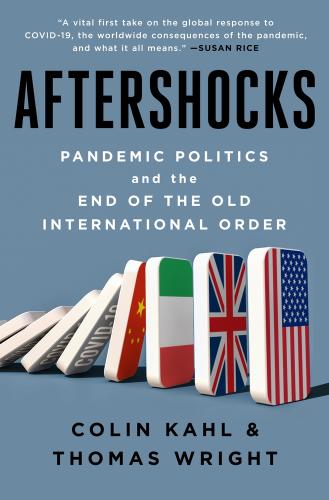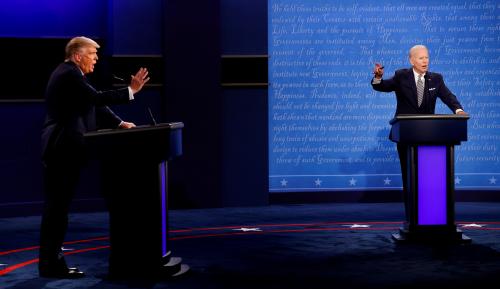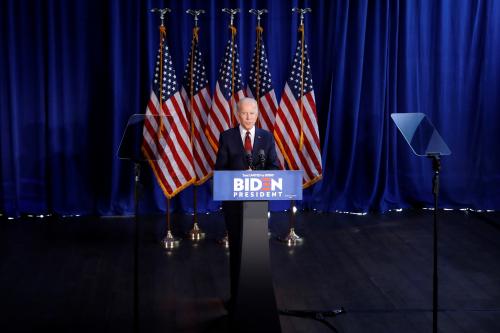Thomas Wright testified before the Senate Committee on Armed Services during its hearing on “Global Security Challenges and Strategy.” A video recording of the hearing can be found here.
Thank you Chairman Reed, Ranking Member Inhofe, and distinguished members of this committee. It is a great honor to appear before you today to speak about the global security environment and implications for U.S. defense policy.
I am a senior fellow at the Brookings Institution. In 2017, I published a book, All Measures Short of War: The Contest for the 21st Century and the Future of American Power which described the end of convergence—the notion that Russia and China would integrate into the liberal international order—and the advent of a new era of intensified great power competition.
Two Near-Worst Case Scenarios
If we measure today’s security environment by what was expected a decade or so ago, it is clear that the United States is facing near worst-case scenarios on both great power competition and transnational threats. This is compounded, moreover, by a negative synergy between them that makes each even more dangerous and difficult to deal with.
Over the past decade, China and many other authoritarian states have become both more repressive at home and more assertive abroad. Unlike in the 1990s and early 2000s, they are willing to use hard power to push back against the United States and to achieve their objectives. Fearful that liberal democracy and the US led international order will undermine their regimes, they are systematically seeking to create an international order safe for autocracy, which includes shaping and interfering in the politics and society of democracies.
Meanwhile, COVID-19, which is by no means the most lethal form of pandemic we could face in our lifetimes, has claimed over two and a half million lives, including those of over 500,000 Americans, and cost more than $26 billion. It has simultaneously upended the lives of billions of people around the world and roiled the domestic politics and economies of key countries in ways that will have repercussions for years to come.
Indeed, the COVID-19 crisis illustrates the negative synergy between great power competition and transnational threats—one that fundamentally changes both for the worse. The autocratic nature of the Chinese regime and its paranoia about its hold on power and standing in the world made it less likely to cooperate with the international community. It covered up the virus in the crucial early months and continues to withhold vital information from the World Health Organization. The current pandemic highlights the way in which China has increased its influence in international institutions in ways that damage the interests of other nations. And, independently of Chinese behavior, the more nationalistic outlook of governments around the world has undermined the type of international cooperation we are used to witnessing in a crisis and reinforced the sense that every nation is fending for itself.
The pandemic will have long-term strategic consequences for the United States and the international order. While the United States saw a 3.5% economic decline in 2020 and other democracies saw even more staggering losses, China’s economy grew by 2.3%. By one measure, China has gained five years on the United States and will now become the world’s largest economy by 2027 rather than 2032. Early talk of China’s “Chernobyl moment” has long passed, and it is now clear that the Chinese government believes it has emerged stronger from a global crisis for the second time in fifteen years (the first occasion being in the aftermath of the financial crisis). China took this opportunity to dramatically increase its geopolitical assertiveness: it cracked down on Hong Kong; it clashed with India; and it has embarked on an ambitious diplomatic effort to increase its influence overseas through the selective distribution of medical supplies and vaccines. It is also likely that the long-term effects of the pandemic will be to plunge parts of the developing world into crisis and place severe downward pressure on defense budgets in U.S. allied countries, including in Europe.
The pandemic reveals that issues we traditionally think of as fostering cooperation are, in our world, more likely to take on competitive characteristics. To take another example, the race to mitigate climate change may also become its own area of competition between the United States and China. The United States and Europe will be competing with China for a technological edge on innovations to produce a carbon-neutral economy and for access to raw materials (magnets, batteries, highperformance ceramics, and LEDs, among others). In some of these areas, the United States and Europe are at risk of dependence on China, so it is critical to ensure that the free world become more self-reliant when it comes to the decades-long effort to develop clean technology.
It is commonplace for experts to talk about U.S. strategy prioritizing traditional threats or transnational threats. What we need today, however, is a comprehensive strategy that not only tackles both, but recognizes the linkages between the two, and the way in which these threats undermine our interests and the international order. The crises of 2020 demonstrate that the United States must prepare for a world with more severe and frequent global shocks, against a backdrop of emboldened adversaries and limited cooperation between the major powers. This certainly means competing strategically with China. But it also means taking concrete steps to limit the fallout from the pandemic in the free world and like-minded states. The United States and its allies must prepare to deliver public goods, like global public health, in this environment, which will likely mean building new coalitions of the like-minded.
Deterring Revisionist Powers
As we contemplate a world in which the United States and its allies compete with China and other autocratic regimes beneath the threshold of war, we cannot lose sight of the traditional mission of postwar U.S. strategy: to deter aggression by adversaries. This too has become more complicated as great power rivalry has intensified.
We often think of revisionist powers as countries hell-bent on global domination, like Nazi Germany or the Soviet Union. But revisionism rarely manifests itself with all-out war. Revisionist states traditionally go after the non-vital interests of their great-power rivals, because this generally doesn’t provoke the type of retaliatory strike that attacking a vital interest would. Threatening non-vital interests—for example, by attacking a non-ally—leaves the status quo power torn over how to respond and whether retaliation is worth it.
Of course, the term “non-vital interest” is somewhat misleading. It only holds true when viewed narrowly and in isolation. While annexation and unprovoked invasion clearly constitute a breach of the peace and threaten vital U.S. interests, seizing small rocks or strips of territory poses a more ambiguous threat. Such moves appear to be of limited strategic importance, until, in the aggregate, they acquire much greater value. At the outset, the fact that no treaty has been breached and the territory seems to be of limited importance is highly significant to the dynamics and psychology of any given crisis. It is precisely the small strategic value of the contested territory that causes the dominant power to refrain from going to war over it at an extraordinary cost, one that would be vastly and inversely proportionate to the value the dominant power places on the disputed territory.
This is not a new problem. It is textbook revisionism, and it poses the most complex problem a major power can be confronted with. The purpose of revisionism is to make deterrence extremely hard and to encourage rival great powers to accommodate them diplomatically or to limit their response, to the point of being ineffective. While a regular security dilemma between two status quo powers can be addressed with reassurance and transparency, a revisionist power will not be satisfied with the restraint of others.
The most important piece of the postwar American order is not the United Nations or international financial institutions, important as they are. It is healthy regional orders. America’s greatest success after World War II was to create a system in Western Europe and North East Asia that brought an end to German and Japanese imperialism and provided the basis for shared prosperity. If those regional orders fall apart, so will the global order. A war between China and Japan, for example—the world’s second and third largest economies, would have massive repercussions for the global economy. A Russian incursion into the Baltics would raise the risk of nuclear war between the world’s two largest nuclear powers.
It should come as no surprise that China and Russia are regionally focused. After all, major powers are usually primarily concerned with their immediate environment rather than abstract notions of global leadership. But it is the vulnerability of regional orders that makes the global order vulnerable. If there is a major challenge to the international order, it is most likely to occur at the regional level. It is for this reason that Russian and Chinese activities in their neighborhoods are more reflective of their approaches to the international order than of their explicit policy on global issues, although those are also important. Ultimately, a country’s willingness to honor the norm against territorial conquest is much more important than its compliance with the dispute settlement mechanism of the World Trade Organization or voting weights at the IMF.
Recommendations
The United States needs to enhance its strategic competitiveness vis-à-vis China and other authoritarian powers. In that regard, I recommend the following:
- Pursue military modernization to continue to reorient U.S. defense policy toward dealing with major power competitors. The United States must also integrate initiatives to improve strategic competitiveness with efforts to rebuild the domestic economy after the pandemic, including a strategic approach to technological innovation and reducing the vulnerability of certain sectors of our society to interdependence with adversaries. Strategic thinking must also be integrated across all relevant government agencies and departments.
- Nest competition with China in a positive and affirmative vision of the free world, which we would continuously work to strengthen and improve. This would include: increasing the free world’s resilience to pressure and shocks from authoritarian states; protecting democracy and the rule of law from illiberal forces; coordinating on technology policy; enhancing cooperation on transnational challenges such as climate change and global public health; and developing a suite of capabilities to shape the international order. It must also involve an ambitious and proactive effort to help free societies and like-minded partners recover from the pandemic, including in the developing world.
- Continue to deepen U.S. alliance and partnerships in the Indo-Pacific, including by focusing on deterrence by denial, improving the credibility and resilience of the U.S. presence in the region, encouraging cooperation between allies and partners, assisting allies and partners in responding to external coercion and interference, deepening cooperation with India as it balances against China, and strengthening ties with Taiwan.
- Reform the 2% defense spending target for NATO to incentivize European allies to invest in civilian as well as military capabilities—such as new technologies—that would enable them to compete with China. This must be supplemented with a sophisticated American “Europe strategy” that allays European concerns about strategic competition with autocratic powers and rethinks European security to enable the European Union to play a greater role in security and defense.
- Facilitate a national conversation about the type of strategic competition we want to engage in. Great power competition is not a strategy in itself; it is a condition that we must cope with in all of its dimensions. We are still at a relative early stage in identifying different strategies of competition although considerable progress has been made with liberal, conservative, realist, and progressive alternatives. Over the next four years, we must refine and develop our thinking on the objectives of the competition and the means to accomplish these accordingly.
The Brookings Institution is committed to quality, independence, and impact.
We are supported by a diverse array of funders. In line with our values and policies, each Brookings publication represents the sole views of its author(s).









Commentary
TestimonyGlobal security challenges and strategy
March 2, 2021